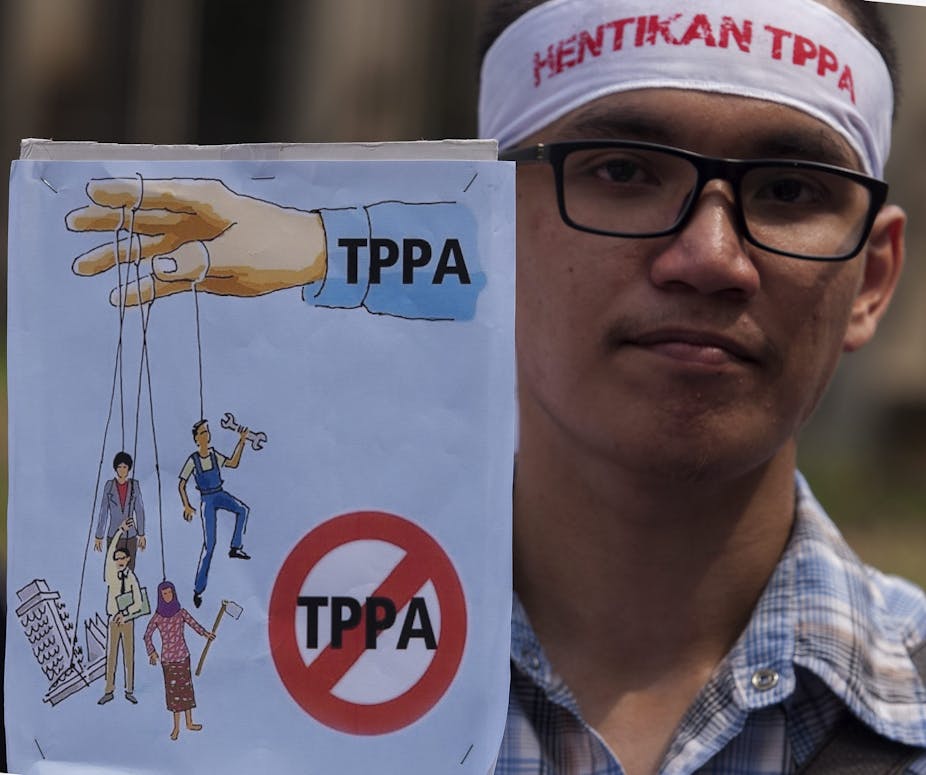
University of Sydney apporte un financement en tant que membre adhérent de The Conversation AU.
Voir les partenaires de The Conversation France

In the history of trade agreement negotiations, most have been undertaken in secret, justified on the grounds that the governments’ negotiating positions would be weakened if they became public.
But this justification is losing credibility as trade agreements increasingly deal with regulatory issues normally determined through public democratic and parliamentary processes.
The Trans-Pacific Partnership negotiations involve the US, Australia and ten other Pacific Rim governments - six of which have bilateral trade agreements with the US. There have been 19 rounds of negotiations held over three years in different countries, and there is now pressure to finish by the end of 2013.
The US is driving the agenda, and its objectives are not entirely about trade in goods, but to establish US-style regional regulatory frameworks which meet the demands of its major export industries. These include pharmaceuticals, media, information technology, agribusiness and financial services, all of which are demanding changes to other governments’ domestic regulation. This “architecture for a 21st century trade agreement” is clearly designed to meet US economic and strategic interests, but not those of other countries.
The TPP negotiations are dealing behind closed doors with policies which would normally be decided by domestic public and parliamentary debate. Pressure from civil society and perceptions of their own national interest have led other governments to resist key US proposals, as shown in the most recent leaked version of the Intellectual Property Chapter.
The agenda includes stronger patents and higher prices for medicines, and reduced rights for governments to regulate medicine prices, food labelling and local content in media. It would also give foreign investors the right to sue governments over health and environmental policies through Investor-state Dispute Settlements.
However community opposition is also based on the lack of transparency within the TPP negotiations.
In Australia, trade agreement texts are only released for public and parliamentary discussion after signed by the Cabinet. There is a review by the Joint Standing Committee on Treaties, but the text cannot be changed. Parliament only debates the legislation required for the implementation of the agreement. Many aspects of the text which would limit the regulatory space for current and future governments, for example ISDS, do not require legislation.
Over the last decade the growing opposition to secrecy in trade negotiations has resulted in some examples of greater transparency.
Since 2003, World Trade Organisation proposed texts, offers and background papers have been placed on the WTO public website. In the case of the Anti-Counterfeiting Trade Agreement (ACTA), which dealt with the extension of intellectual property rights, there was so much controversy that governments agreed to release the text in 2011 before it was signed. So there are precedents for both the release of negotiating documents and the release of final text before it has been signed by governments.
In the case of the TPP, the controversy over secrecy was fuelled by a leaked 2011 version of the intellectual property chapter which revealed on the front page that the negotiating documents could not be released until four years after the completion of the negotiations.
The TPP process has included some consultation - an improvement on previous bilateral negotiations - but it is severely limited by a lack of access to the text. Civil society groups were able to attend and make very short presentations to negotiators during most TPP negotiating rounds, but this practice has now ceased in the final stages. In Australia, negotiators have briefed civil society organisations twice a year, and have also been available for separate meetings on particular topics. But they cannot reveal the detail of what is in the text. Most detailed information has come from leaked documents, industry media and specialised trade media reports.
In the US, trade advisory committees permit 600 corporate advisers and a very small number of other non-government organisations to have more access to the detail of the text, but they are sworn to secrecy. US Congress members have complained about their lack of access to the text as a reason for opposing the fast-tracking of the TPP through the Congress.
The previous ALP government opposed ISDS and the extension of medicine patents and claimed these policies would not be negotiated away. The Coalition policy is to negotiate on ISDS and other issues, trading democracy and sovereignty for promised increases in market access.
The minimum requirement for a sovereign, democratic public policy process is for the text of the TPP and other trade agreements to be released for public and parliamentary discussion before they are signed.
This is the third piece in our series on the Trans-Pacific Partnership.
Read the other pieces: